Everything You Want to Know about Boston University’s $550 Million Warren Towers Renovation Project
From the timetable to changes to rooms, suites, air conditioning, the dining hall, bike storage, and much more, here’s what to expect
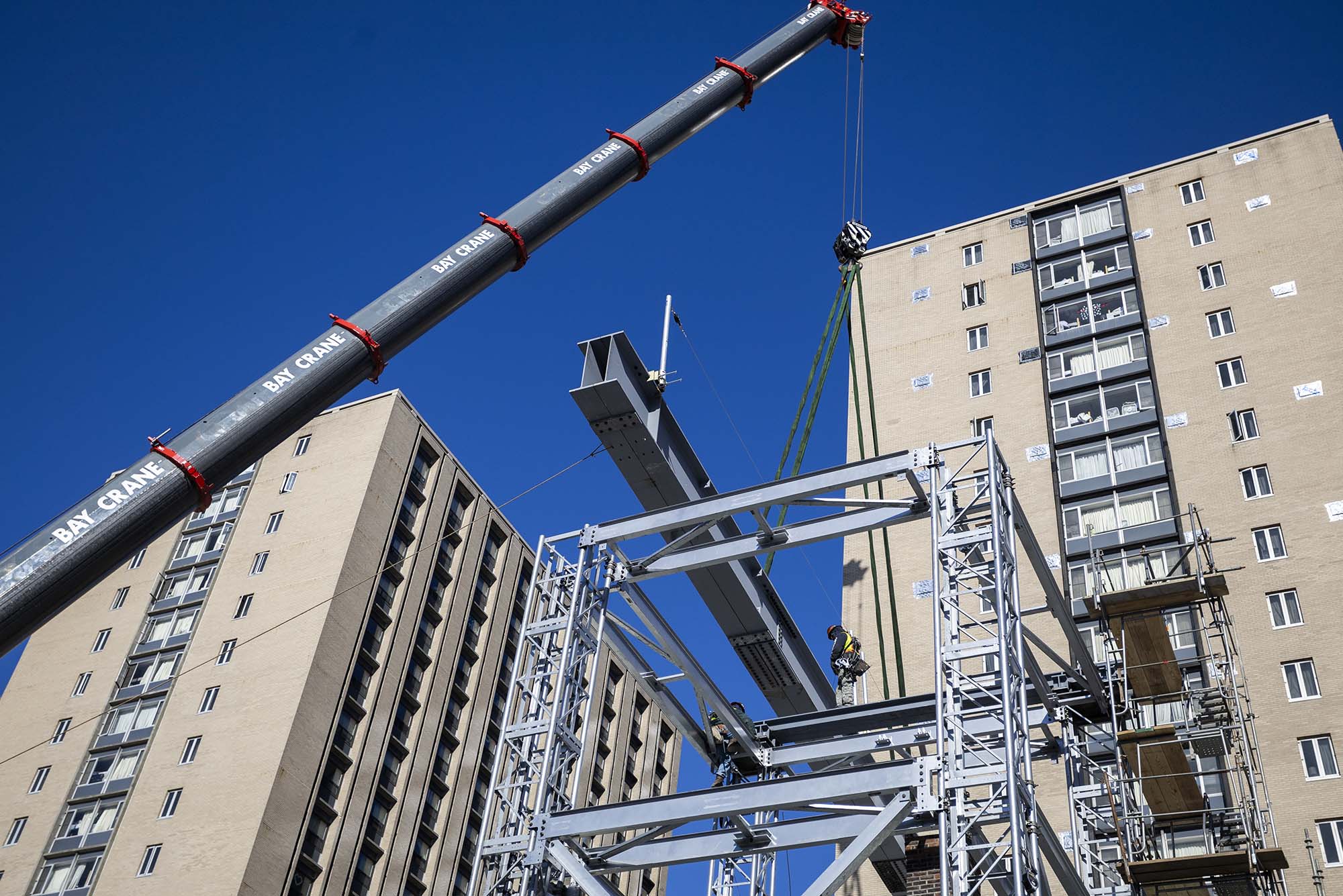
Preliminary work has begun on the renovation of Warren Towers. It’s expected that the renovation will be largely completed by August 2028. Photo by Jake Belcher
Everything You Want to Know about Boston University’s $550 Million Warren Towers Renovation Project
From the timetable to changes to rooms, suites, air conditioning, the dining hall, bike storage, and much more, here’s what to expect
It’s the second-largest nonmilitary dormitory in the country, three towers along Boston’s busy Commonwealth Avenue housing 1,800 Boston University undergraduates. After more than half a century of wear and tear, it’s time for a few upgrades to Warren Towers—major upgrades. We reached out to the people in charge of the massive $550 million renovation project for all the nitty-gritty details about what to expect.
Q&A
BU Today: What is the timetable for the project? When will actual construction begin, and what is the plan for when it will be finished?
Some of the early project work started in late December 2024. This includes the sidewalk protection on Commonwealth Avenue and building the access bridge from Cummington Mall, as well as scaffolding on Tower A. The A-Tower renovation will begin as soon as current residents are out of the building for the summer, and it will be completed in August 2026. The subsequent towers will follow the same sequence and duration. The B-Tower work will be from December 2026 through August 2027; C-Tower from December 2027 through August 2028. The work at the ground level floor along Commonwealth Avenue may continue into the summer of 2029.
BU Today: Why is this project being done now? Has something made it more urgent?
Warren Towers has been in the planning stages for several years. Because of the scale of this project, it takes time to develop a project plan.
BU Today: Given the length and cost of the project, was consideration ever given to just knocking Warren Towers down and starting over?
During the conceptual stage, we did consider demolishing the building and constructing a new facility. A detailed cost analysis proved that a renovation was the most cost-effective way to approach this project, and there was also a certain desire, from a sustainability perspective, to breathe new life into an old building as opposed to just knocking it down. Another consideration was the need to provide housing to existing and future students. If we had demolished the building, we would have had to find 1,800 beds for students until a new building was constructed.
Also, new construction would have to consider providing dining capabilities supporting the core of Central Campus, retail spaces that support the core of Central Campus, and parking for Central Campus needs.
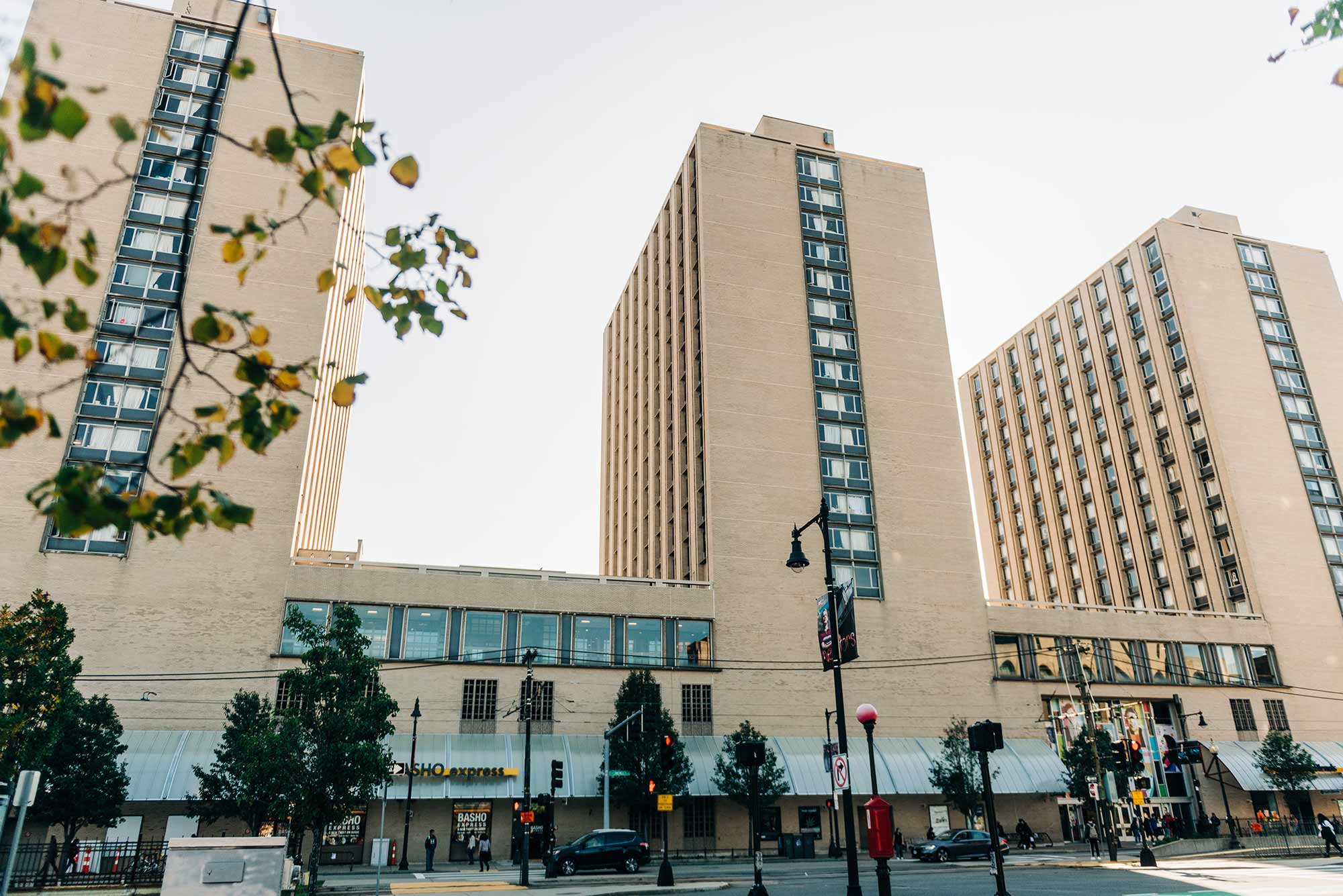
BU Today: A project of this size and magnitude on an urban campus is bound to have pain points and cause some disruptions. Can you talk about where people might experience some disruptions or changes while construction is ongoing, so the community can be prepared as much as possible?
With a project of this size—thousands of workers operating in a confined space—some disruptions are inevitable. However, we are committed to minimizing any inconvenience as much as possible.
There will be times when the work will be noisy, which is why it is not scheduled to start until 9 am each day. Our thinking is that most students will be out of their rooms and involved in their academic or work activities. We also recognize the importance of clear and timely communication, and we’re actively working to enhance our outreach efforts. Our goal is to keep building occupants and nearby offices well informed so they can anticipate any impacts.
The Project Team is dedicated to making this process as smooth as possible. We are continuously evaluating our approach, learning from each phase, and looking for ways to improve as we start working on Tower A. The lessons learned will be applied to the project’s future phases (Tower B and Tower C).
BU Today: Can you explain why the A-Tower work is happening first?
The project begins with A-Tower, which is nearest to the Dining Hall. We need to perform critical mechanical work to support the Dining Hall renovation, which is one of the main reasons we chose to start at A-Tower.
BU Today: Will the project affect housing assignments?
For students who may be impacted by housing assignments as a result of the project, the University is working directly with them.
BU Today: How will Boston University handle housing arrangements for displaced students during construction phases?
For fall 2025, plans are to assign the 595 students from Warren Towers (A) to the Fenway Campus. Fenway will be a first-year student campus and will be broadly supported by the Office of Residence Life.
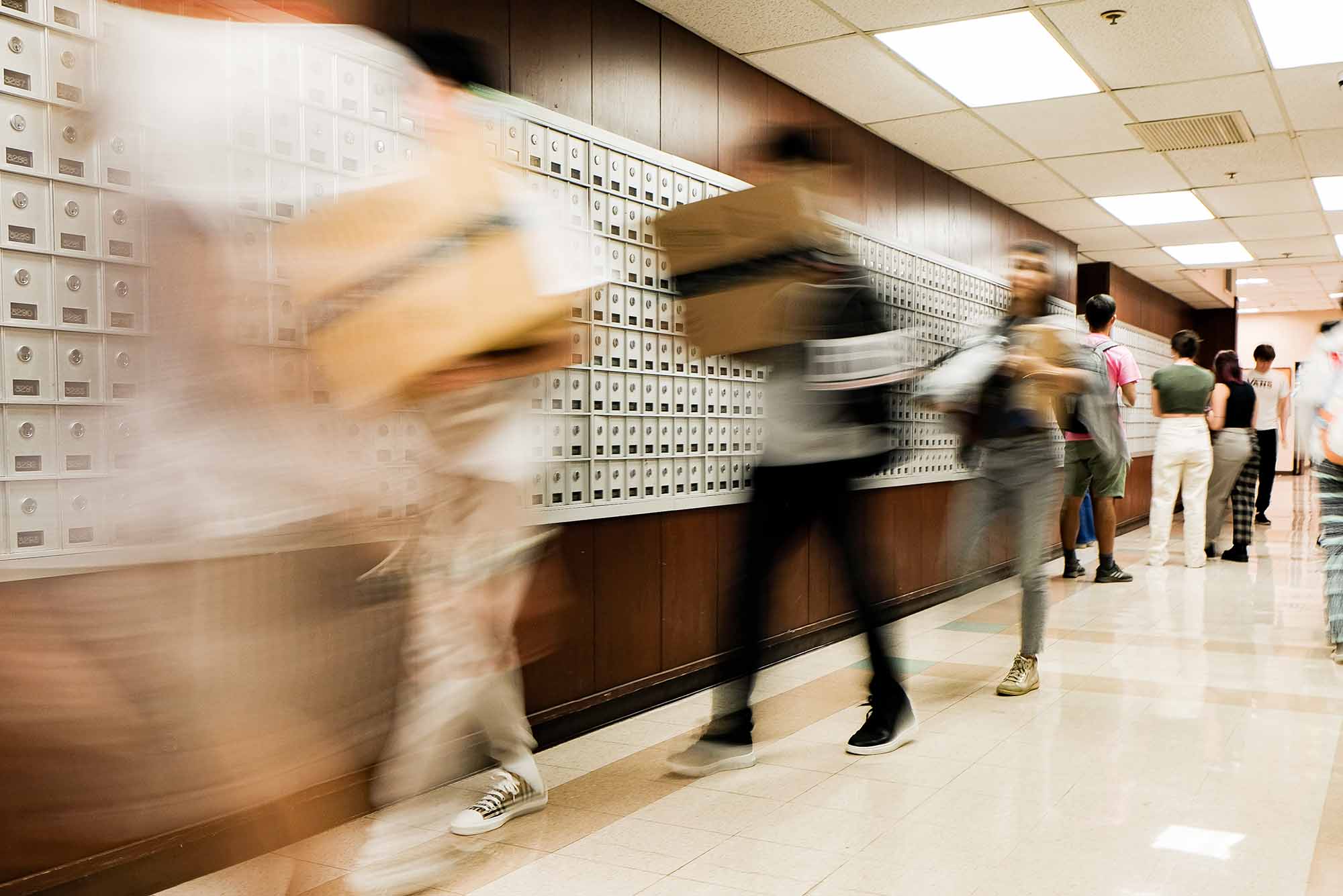
BU Today: While each tower is under construction, will the other towers be open to house summer residents?
No. During the summer months, all of Warren Towers will remain closed to maintain the aggressive construction schedule and to minimize the noise impact on residents.
BU Today: What are the most significant changes students will notice to the building?
The sleeping rooms will be renovated to include new flooring, improved lighting, air conditioning, new furniture, electronic locks, and new operable windows. The bathrooms will be completely renovated from gendered multiuser rooms to all-gender single rooms with a toilet, sink, and shower. Each floor will continue to have a lounge with new finishes and AC, similar to the sleeping rooms.
The Dining Hall and the student common areas on the fourth floor will also be renovated. The common areas will be reconfigured to add more meeting and activity spaces.
BU Today: There have been some problems with elevators and escalators. Are those resolved?
The project does replace the escalators. The elevator cabins will be refurbished and the existing electronics will be upgraded.
BU Today: Is only the interior of the building affected, or will any construction also affect how the outside of the building looks?
The windows and their surrounds at the towers and the fourth floor will be replaced with triple-glazed operable windows and aluminum surrounds, to provide a more energy-efficient envelope. The brick masonry will also be repointed, repaired, and cleaned. All roofs will be replaced and a metal panel roof screen will be added at the top of each tower to mask the new mechanical equipment.
The sidewalks at Commonwealth Avenue will be regraded to provide accessible entries into all retail stores. Some new planters with trees will be added to facilitate this improvement. A new canopy will be installed along Commonwealth Avenue, and new storefronts will be provided for the ground floor retail stores and the building entrance, as well as new wall treatments at the street level.
New streetscape design will bring more natural light into the building, creating a bright, open modern appearance. The glazing will have insulating abilities and have soundproofing characteristics.
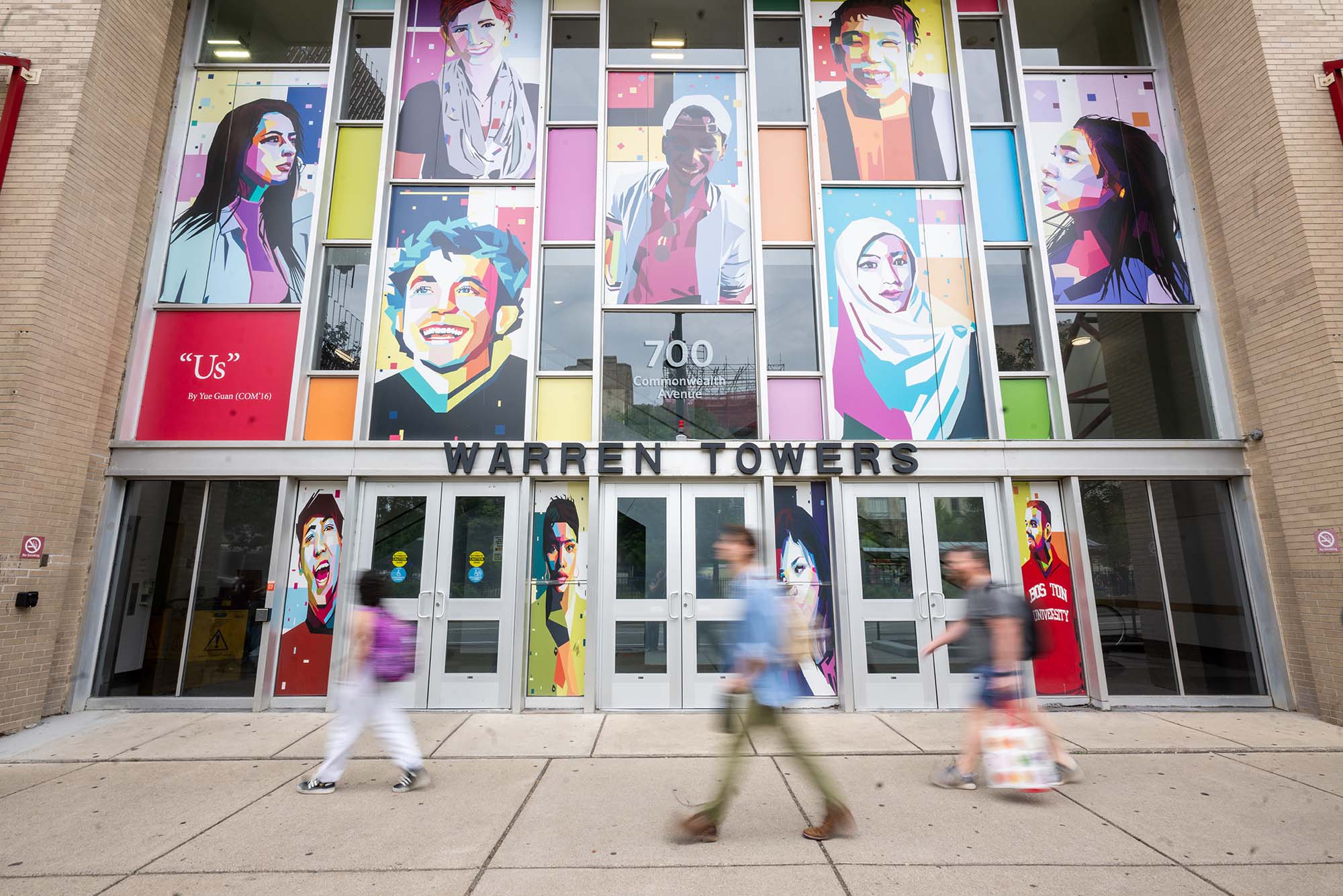
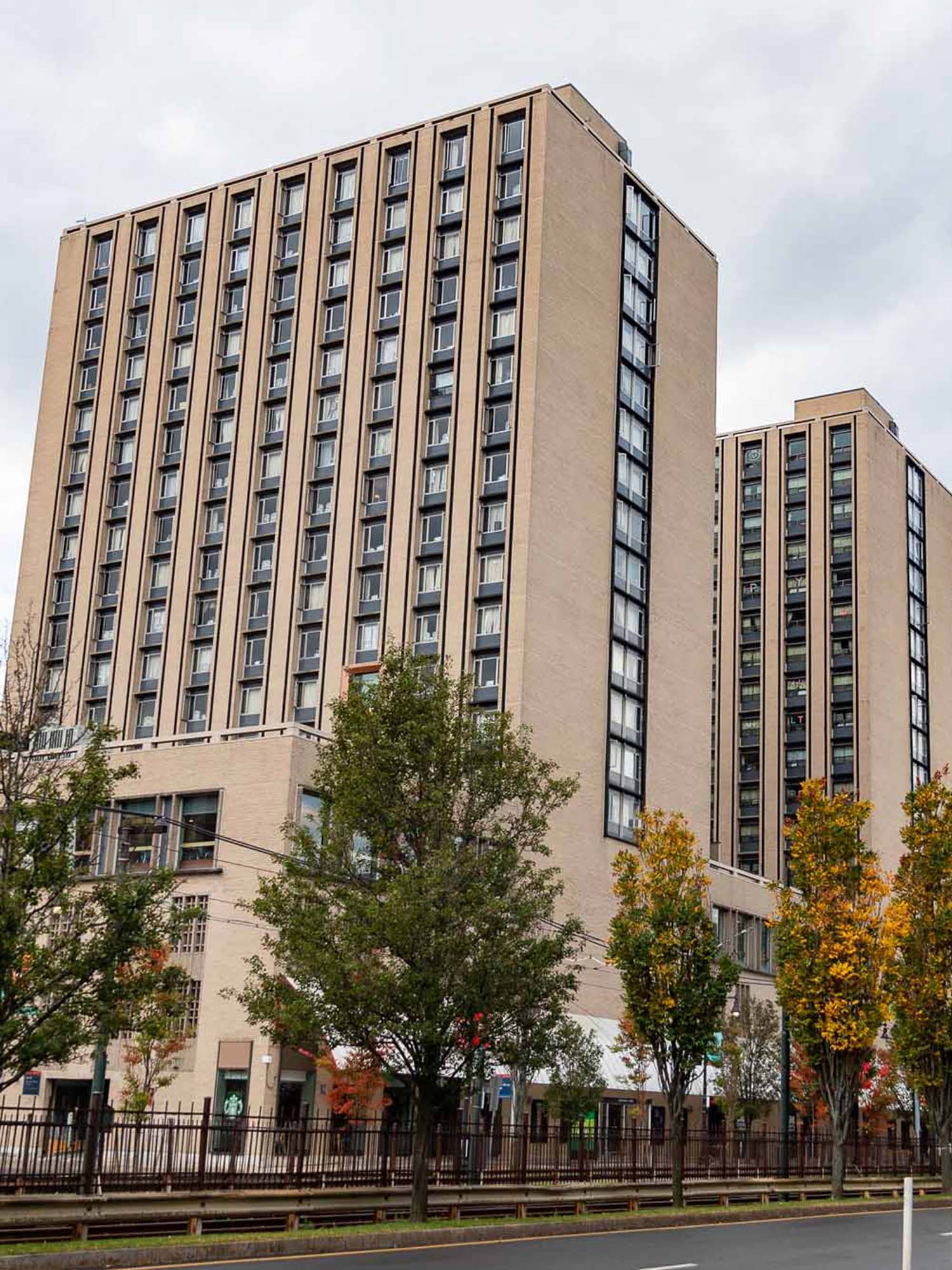
BU Today: What will happen to the stores (like Starbucks and Subway) on the ground floor of the building during construction?
These stores will remain open for the duration of the project. The work at the ground floor of Commonwealth Avenue, to add a new canopy and storefronts, will impact these retail stores during the project’s latter timeline.
We are exploring using Grubhub for the construction team so the existing food service infrastructure is not overwhelmed by 500 possible workers who will be on site.
BU Today: Will the new Warren Towers complex have any interesting new features?
The bike storage area in the garage will be increased from 68 to 307 spaces.
From an electrical standpoint, each tower will be metered to track energy usage. All three towers will have generators, with emergency power also provided to the fourth floor dining and student activities spaces.
There will also be the capability for an external generator to connect to Warren Towers if we ever need to provide power to all of the facilities in an emergency situation.
BU Today: Can you talk about how the buildings will be powered?
Warren Towers will be all-electric and with the BU Wind offset of our electric utility provider, it will also be net zero carbon and contribute to BU’s reducing its carbon footprint. This meets the City of Boston’s new zoning requirements for carbon emissions.
New building automations systems will be in place to control all building mechanical equipment and provide notification of systems if there is trouble. For example, concerns related to hot and cold calls can be evaluated at the control center, allowing quicker response to reported issues.
There will also be a new fire command room and fire alarm services.
BU Today: People have long complained that the rooms weren’t air-conditioned. Can you explain how that will change?
Each sleeping room will have AC and will be individually controlled by a thermostat in the room. The new systems that will be in place put special consideration to sound and individual adjustments.
BU Today: Will access to the building change or be different in any ways?
There will be a new service for card access and monitoring by cameras will be much more extensive. The fourth floor will have new and additional access gates such as those found in Mugar Memorial Library, providing better security and limiting piggyback entry, but allowing more student throughput and eliminating log jams entering fourth floor Dining and suites.
BU Today: Will the suites in Warren Towers see big changes?
Yes. Here are some examples:
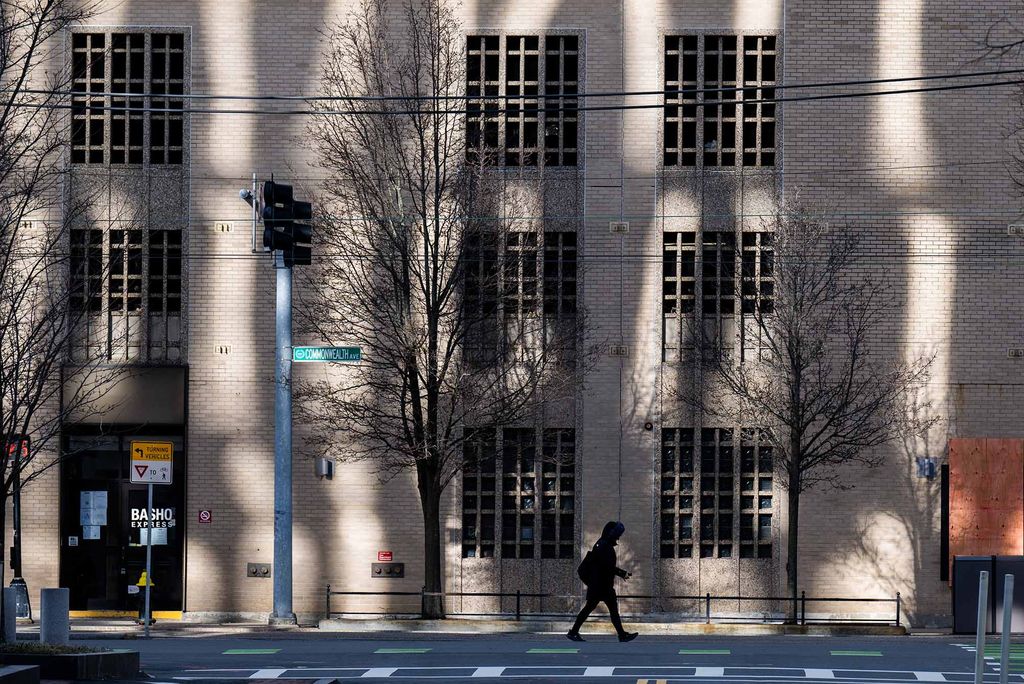
- Larger windows that are operable in the suites.
- All concrete masonry walls will be covered by drywall.
- Rooms will now have sustainable floor materials.
- All the doors entering the suites will be enlarged to comply with the Americans with Disabilities Act.
- Accessible suites will be strategically located throughout the building.
- All rooms will have card access and will no longer need keys.
- Rooms will have new furniture and LED dimmable lighting.
- Air conditioning will be added throughout the suites and the common areas on the fourth floor.
Photo by Cydney Scott
BU Today: How about bathrooms. Any changes worth mentioning?
They will be ADA-compliant. The bathrooms will be converted from gendered multiuser to all-gender single user rooms that will include a toilet, sink, and shower. Most of the new all-gender bathrooms will be accessible.
BU Today: And the hallways?
The hallways will receive new finishes and lighting. New carpeting in the hallways will reduce sound transmission. There will be bottle filling stations and recycling stations. LED dimmable capability lighting will help reduce energy usage, and in the stairwells, too.
BU Today: Let’s talk about the fourth floor, since so much happens up there. What are the biggest changes?
Dining Services will now have new electrical cooking equipment and the serving stations will be renovated. Dining will also have new furnishings. The fourth floor student activities spaces will be fully renovated to provide more lounge, exercise, and meeting spaces as well as smaller breakout rooms. The Residence Life offices will be renovated to be more welcoming to the students. There will also be a larger laundry room with new all-electric washers and dryers.
BU Today: Are there ways for students to stay updated on the project or to ask questions about it?
Campus Planning and Operations (CPO) maintains the Warren Towers Renovation website, which is updated weekly with news and information about the project.
BU Today: How will Move-out in spring 2025 be impacted by all this work?
May 20, 2025, is the last day providing full access for Move-out for students and service containers typically lining Cummington Mall. After this date, Hinsdale Street and Cummington Mall will have restrictions on accessibility. This will be in effect until fall 2025. Cummington Mall and Hinsdale Street will then be available again for use with limited restrictions. Coordination of services has already been put in place with operational services from Facilities, Retail, Residences/Housing, Parking, and Public Safety.
Answers were provided by Sonia Richards, Paul Riel, John Barton, and information from the City of Boston’s Building Emissions Reduction and Disclosure.
Comments & Discussion
Boston University moderates comments to facilitate an informed, substantive, civil conversation. Abusive, profane, self-promotional, misleading, incoherent or off-topic comments will be rejected. Moderators are staffed during regular business hours (EST) and can only accept comments written in English. Statistics or facts must include a citation or a link to the citation.